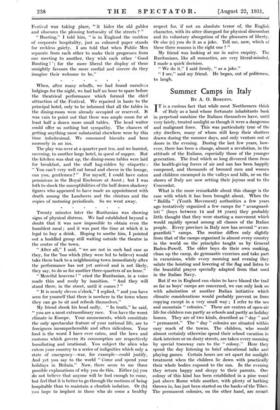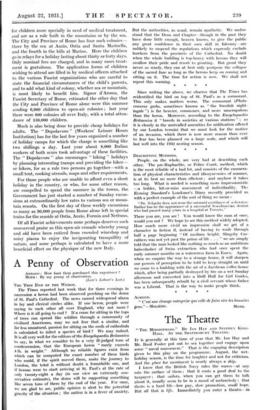Summer Camps in Italy
BY A. 0. ROBERTS.
IT is a curious fact that while most Northerners think of Italy as a land whose fortunate inhabitants bask in perpetual sunshine the Italians themselves have, until very lately, treated sunlight as though it were a dangerous and malignant force. This was particularly true of the city dwellers, many of whom still keep their shutters drawn during the summer days, and only venture out of doors in the evening. During the last few years, how- ever, there -has been a change, almost a revolution, in the attitude of the Italians, especially those of the younger generation. The feud which so long divorced them from the health-giving forces of air and sun has been happily composed, and thousands of bronzed men and women and children encamped in the valleys and hills, or on the shores of Italy are now setting their joyous seal to the Concordat.
What is the more remarkable about this change is the ease with which it has been brought about. When the " Balilla " (Youth Movement) authorities a few years ago 'tentatively organized a few camps for " avanguard- isti " (boys between 14 and 18 years) they probably little thought that they were starting a movement which would rapidly spread among all classes of the Italian people. Every province in Italy now has several " avan- guardisti " camps. The routine differs only slightly from that of the camps organized in almost every country in the world on the principles taught us by General Baden-Powell. The older boys do their own cooking, clean up the camp, do gymnastic exercises and take part in excursions, while every morning and evening they salute the hoisting and lowering of the flag and listen to the beautiful prayer specially adapted from that used in the Italian Navy.
But if we in England can claim to have blazed the trail so far as boys' camps are concerned, we can only look on with admiration at another Italian initiative which climatic considerations would probably prevent us from copying except in a very small way ; I refer to the sea and mountain " colonies." These are centres of open-air life for children run partly as schools and partly as holiday homes. They are of two kinds, described as .!` day " and " permanent." The " day " colonies are situated within easy reach of the towns. The children, who would almost certainly otherwise spend their school vacation in dark interiors or on dusty streets, are taken every morning by special tramway cars to the " colony." Here they spend the day listening to brief educational talks and playing games. Certain hours are set apart for sunlight treatment when the children lie down with practically their whole bodies exposed to the sun. In the evening they return happy and sleepy to their parents. One colony of this kind has been established in a pine wood just above Rome while another, with plenty of bathing thrown in, has just been started on the banks of the Tiber. The permanent colonies, on the other hand, are meant for children more specially in need of medical treatment, and are as a rule built in the mountains or by the sea. The City and Province of Rome has four such colonies— three by the sea at Anzio, Ostia and Santa Marinella, and the fourth in the hills at Marino. Here the children go in relays for a holiday lasting about thirty or forty days. Only nominal fees are charged, and in many cases treat- ment is gratuitous. The application forms of children wishing to attend are filled in by medical officers attached to the various Fascist organizations who are careful to state the financial circumstances of the child's parents, and to add what kind of colony, whether sea or mountain, is most likely to benefit him. Signor d'Aroma, the Fascist Secretary of Rome, estimated the other day that the City and Province of Rome alone were this summer sending 6,000 children to open-air colonies ; last year there were 800 colonies all over Italy, with a total atten- dance of 150,000 children.
Much is also being done to provide cheap holidays for adults. The " Dopolavoro ". (Workers' Leisure Hours Institution) has for the last few years organized a number of holiday camps for which the charge is something like two shillings a day. Last year about 8,000 Italian workers of both sexes took advantage of these facilities. The " Dopolavoro " also encourages " hiking " holidays by planning interesting tramps and providing the hiker— or hikers, for as a rule two persons go together—with a small tent, cooking utensils, maps and other requirements.
For those people who are unable to afford even a short holiday in the country, or who, for some other reason, are compelled to spend the summer in the towns, the Government has just started a number of Sunday excur- sions at extraordinarily low rates to various sea or moun- tain resorts. On the first day of these weekly excursions as many as 80,000 people from Rome alone left in special trains for the seaside at Ostia, Anzio, Formia and Nettuno.
Of all Fascist achievements none perhaps deserves such unreserved praise as this open-air crusade whereby young and old have been enticed from crowded wineshop and noisy piazza to enjoy the invigorating tranquillity of nature, and none- perhaps is calculated to have a more beneficial effect on the physique of the new Italy.































 Previous page
Previous page